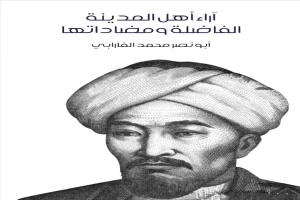Newly released
This book is new and will be uploaded as soon as it becomes available to us and if we secure the necessary publishing rights.

آراء أهل المدينة الفاضلة ومضاداتها Book PDF
(0)
Author:
Abu Nasr Muhammad Al-FarabiNumber Of Reads:
42
Language:
Arabic
Category:
Social sciencesSection:
Pages:
108
Quality:
good
Views:
1060
Quate
Review
Save
Share
New
Book Description
«المدينة الفاضلة» هي ذلك التعبير الذي يستدعي إلى الأذهان أحلام الحكماء والفلاسفة منذ «أفلاطون» حتى «توماس مور» وصولًا إلى العصر الحديث، ولكلٍّ نظرته الخاصة حيال تلك الحياة اليوتوبية المأمولة. و«الفارابي» الفيلسوف العربي الملقَّب ﺑ «المعلم الثاني» كان أول من تبلور لديه مفهوم متكامل للمدينة الفاضلة من منظورٍ عربيٍّ إسلامي، وهو موضوع هذا الكتاب الذي بين أيدينا. ويشتمل الكتاب على سبعةٍ وثلاثين فصلًا، تناول فيها المؤلِّف خمسة موضوعاتٍ رئيسية، هي: الذات الإلهية ممثَّلةً في الموجود الأول، والعالَم بما يحتوي من موجودات؛ جمادات وكائنات حية وأجرام سماوية، والنفس الإنسانية، والأخلاق ومبادئها الأساسية، وأخيرًا حاجة الإنسان إلى الاجتماع. وهنا يصوغ الفارابي صورةً مُثلى للتعاون بين أفراد المجتمع من أجل مدينةٍ فاضلةٍ يسود فيها العدل، وينعم سكانها بالسعادة، وتُمكِّنهم فضائلهم من الصمود في مواجهة المدن الجاهلة.
Abu Nasr Muhammad Al-Farabi
Abu Nasr Muhammad al-Farabi: A Turkish Muslim philosopher, famous for his combination of logic, politics, and ethics. He was nicknamed “The Second Teacher” and had a great influence on the great later Muslim philosophers such as Ibn Sina and Ibn Rushd.
Abu Nasr Muhammad ibn Muhammad ibn Uzlag ibn Tarkhan al-Turki al-Farabi was born in 260 AH/874 AD in Farab, a city in Khorasan (present-day Iran), and his father was a commander in the army. Al-Farabi moved from his city to Baghdad, and there he devoted himself to learning the Arabic language until he mastered it. He was also allowed to study music, complete his studies in languages, medicine, science and mathematics. He met famous Arab sages such as “Abu Bishr” and took from them. A study of ancient and modern times, especially what abounded in the writings of Aristotle's "first teacher", to which al-Farabi paid great attention to study, explanation and analysis.
Al-Farabi wrote most of his books in Baghdad, then moved to the Levant, Egypt, and returned to Damascus again, where Saif al-Dawla al-Hamdani approached him, and included him in his council, which was the complex of virtues in all knowledge. But that position did not promise him money and wealth; He was one of the most ascetic of people, and he was not concerned with worldly gains. He remained in that state, detached from education and writing until his death in Damascus in the year 393 AH / 950 AD at the age of eighty years.
This, and only forty of Al-Farabi’s numerous books have reached us, of which thirty-two are in Arabic, six have been translated into Hebrew, and two have been translated into Latin. Perhaps one of his most famous books are “The Opinions of the People of the Virtuous City,” “The Great Music,” and “The Great Music.” Statistics of science and definition of its purposes.
Read More
Book Currently Unavailable
This book is currently unavailable for publication. We obtained it under a Creative Commons license, but the author or publisher has not granted permission to publish it.
Rate Now
5 Stars
4 Stars
3 Stars
2 Stars
1 Stars
آراء أهل المدينة الفاضلة ومضاداتها Quotes
Top Rated
Latest
Quate
Be the first to leave a quote and earn 10 points
instead of 3
Comments
Be the first to leave a comment and earn 5 points
instead of 3